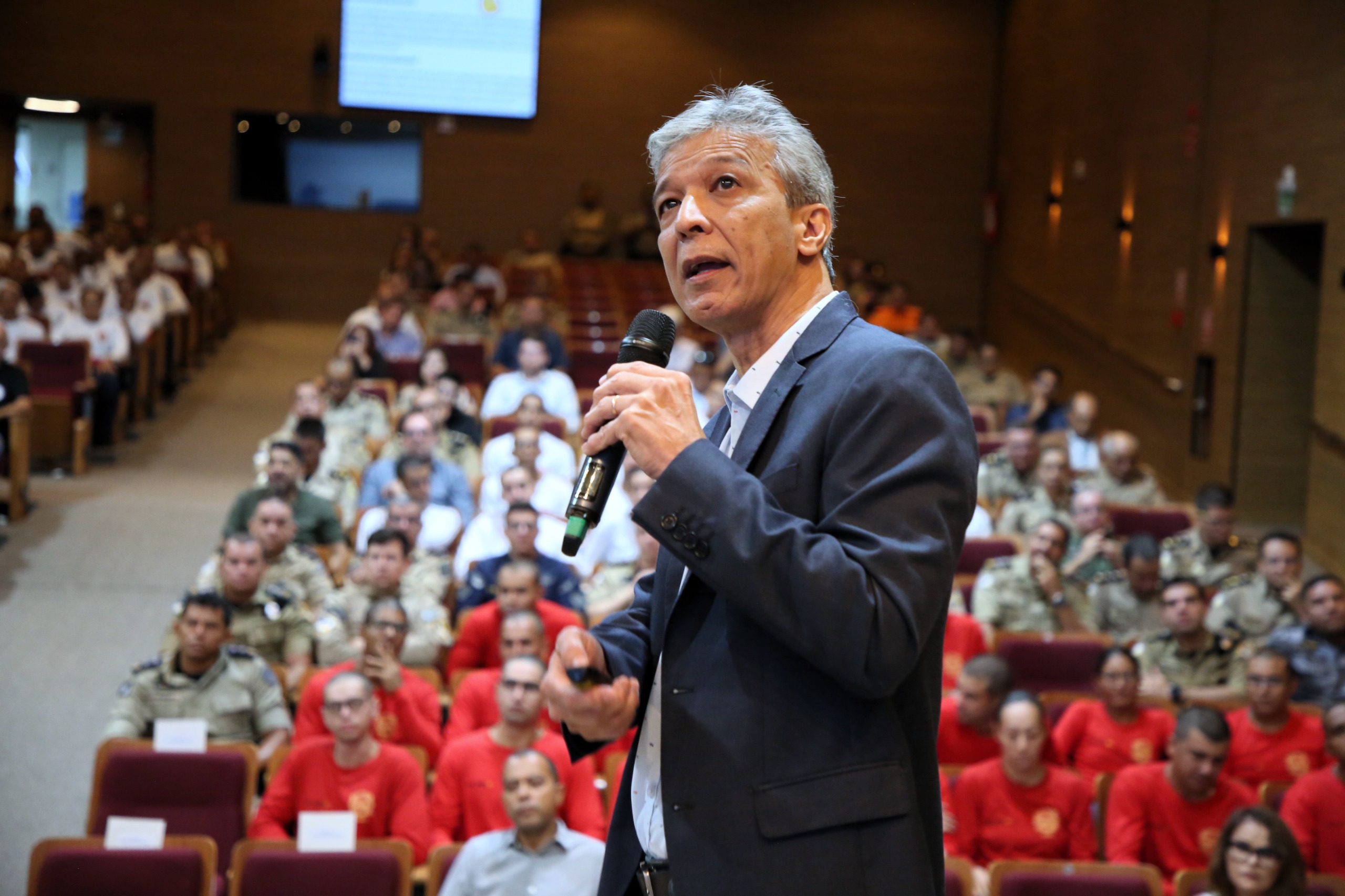
Professor Pery Francisco Assis Shikida spoke this Tuesday morning (July 30th) in the auditorium of the Court of Justice of the State of Tocantins (TJTO), addressing the repercussions of crime from the perspective of criminal law and economics. The lecture was requested by the Association of Military Officers of the State of Tocantins, in partnership with the Association of Servers of the Court of Justice (ASTJ) and the Superior School of the Judges of the State of Tocantins (Esmat).
During the opening of the event, the general commander of the Military Police of the State of Tocantins, Colonel QOPM Márcio Antônio Barbosa de Mendonça, mentioned some of the operations carried out with the support of Professor Pery and stressed the importance of continuous training for public security professionals.
“I am certain that we need to seek qualification and adequate training, adequate integration among the security agencies in order to confront organized crime. We have done this with the integration among the Civil Police, the Criminal Police, the Fire Brigade and the Military Police, which has produced good results,” he said.
The general commander of the Fire Brigade, Colonel Peterson Queiroz de Ornelas, highlighted the importance of the lecture for improving public security and said that the participants will leave better prepared for their duties.
Lecture
When talking about the economic theory of crime, Professor Pery addressed the following questions in part: “Why do individuals decide to commit crimes (of an economic nature)? What are the socio-economic circumstances of the occupational choice between the legal and illegal sectors of the economy? Does crime pay?”. He also highlighted the importance of studying the economics of crime, which should be researched and encouraged on an ongoing basis.
In his speech, Dr. Pery stressed that “the subject of the economics of crime is a very important subject, it doesn't answer all the questions of the criminal sciences but it is an instrument that can subsidize many public policies and the learning that comes from empirical research, that is, listening to inmates who have committed crimes of an economic nature, the learning is very substantial. Because then we see what the reasons are for migrating to crime, to illegal activity, what are the ways of dealing with this based on what they say, whether crime in Brazil, unfortunately, is paying off or not, and we put this on the agenda,” he explained.
“Crime is becoming increasingly operational, technical and intelligent. Fortunately, the security forces are keeping up with this evolution, preventing chaos in Brazil,” he added.
In an interview, the speaker thanked Esmat for the invitation and praised the work of the General Command of the Military Police in the operations. “I'm very grateful to Esmat and the public security forces. The general command of the Military Police has been exemplary, carrying out fantastic operations with effective solutions to tackle crime, whether economic or violent,” he said.




_thumbnail_thumbnail.jpeg)
_thumbnail_thumbnail.jpeg)
_thumbnail_thumbnail.jpeg)
_thumbnail_thumbnail.jpeg)
_thumbnail_thumbnail.jpeg)
_thumbnail_thumbnail.jpeg)
 - Copia_thumbnail_thumbnail.jpeg)
 - Copia_thumbnail_thumbnail.jpeg)
_thumbnail_thumbnail.jpeg)
_thumbnail_thumbnail.jpeg)
_thumbnail_thumbnail.jpeg)
_thumbnail_thumbnail.jpeg)
_thumbnail_thumbnail.jpeg)
_thumbnail_thumbnail.jpeg)
_thumbnail_thumbnail.jpeg)
_thumbnail_thumbnail.jpeg)
_thumbnail_thumbnail.jpeg)
_thumbnail_thumbnail.jpeg)
_thumbnail_thumbnail.jpeg)
_thumbnail_thumbnail.jpeg)
_thumbnail_thumbnail.jpeg)
_thumbnail_thumbnail.jpeg)
_thumbnail_thumbnail.jpeg)
 - Copia_thumbnail_thumbnail.jpeg)
_thumbnail.jpeg)
_thumbnail.jpeg)
_thumbnail.jpeg)
_thumbnail.jpeg)
_thumbnail.jpeg)
_thumbnail.jpeg)
 - Copia_thumbnail.jpeg)
 - Copia_thumbnail.jpeg)
_thumbnail.jpeg)
_thumbnail.jpeg)
_thumbnail.jpeg)
_thumbnail.jpeg)
_thumbnail.jpeg)
_thumbnail.jpeg)
_thumbnail.jpeg)
_thumbnail.jpeg)
_thumbnail.jpeg)
_thumbnail.jpeg)
_thumbnail.jpeg)
_thumbnail.jpeg)
_thumbnail.jpeg)
_thumbnail.jpeg)
_thumbnail.jpeg)
 - Copia_thumbnail.jpeg)
